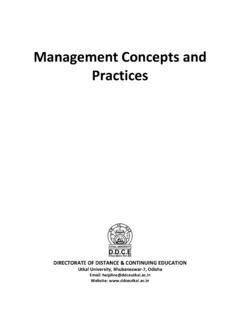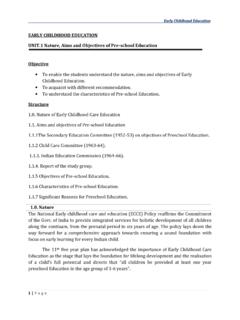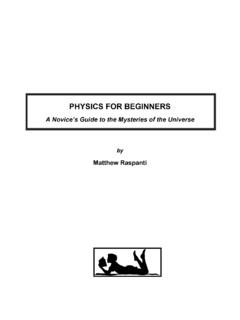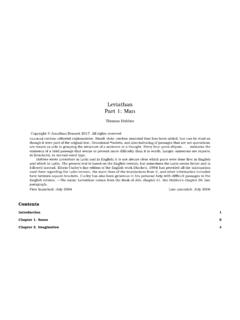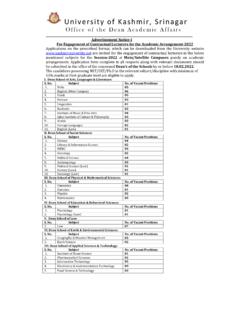Transcription of History - DDCE, Utkal
1 By : Pallavi Talekau, Dr. Jyotrimayee Nayak , 1 of 72 History PAPER -V UNIT I Concept of History Meaning, Nature and Scope of History Aims and Objectives of Teaching History at secondary level Values of Teaching History Structure Introduction Objectives Concept of History Defining History Nature of History The modern concept of History History a Science or an Art Arguments against History as a science History is both a Science and an Art Scope of History Aims and objectives of teaching History at secondary level General Aims of Teaching History Aims of Teaching History at Secondary Stage Objectives of teaching History at Secondary Stage Values of teaching History Summary
2 Unit End Questions Suggested Readings By : Pallavi Talekau, Dr. Jyotrimayee Nayak , 2 of 72 Introduction History is the study of life in society in the past, in all its aspect, in relation to present developments and future hopes. It is the story of man in time, an inquiry into the past based on evidence. Indeed, evidence is the raw material of History teaching and learning. It is an Inquiry into what happened in the past, when it happened, and how it happened. It is an inquiry into the inevitable changes in human affairs in the past and the ways these changes affect, influence or determine the patterns of life in the society.
3 History is, or should be an attempt to re-think the past. Collingwood (1945) is particularly interested in this concept of History . History aims at helping students to understand the present existing social, political, religious and economic conditions of the people. Without the knowledge of History we cannot have the background of our religion, customs institutions, administration and so on. The teaching of History helps the students to explain the present, to analyze it and to trace its course. Cause-and-effect relationship between the past and the present is lively presented in the History .
4 History thus helps us to understand the present day problems both at the national and international level accurately and objectively. In this unit we will be dealing with meaning, nature and scope of History , aims and objectives of teaching History at secondary level and values of teaching History . Objectives After completing this unit, the student will be able to: Define History Explain the nature of History Describe the scope of History Explain the aims and objectives of teaching History at Secondary level Describe the values of teaching History Concept of History History is the analysis and interpretation of the human past enabling us to study continuity and changes that are taking place over time.
5 It is an act of both investigation and imagination that seeks to explain how people have changed over time. Historians use all forms of evidence to examine, interpret, revisit, and reinterpret the past. These include not just written documents, but also oral communication and objects such as buildings, artifacts, photographs, and paintings. Historians are trained in the methods of discovering and evaluating these sources and the challenging task of making historical sense out of them. History is a means to understand the past and present. The different interpretations of the past allow us to see the present differently and therefore imagine and work towards different futures.
6 It is often said to be the queen or mother of the social sciences. It is the basis of all subjects of study which fall under the category of Humanities and Social Sciences. It is also the basis of the study of philosophy , By : Pallavi Talekau, Dr. Jyotrimayee Nayak , 3 of 72 politics, economics and even art and religion. No wonder, it is considered an indispensible subject in the complete education of man. Defining History The origin of the word History is associated with the Greek word Historia which means information or an enquiry designed to elicit truth . History has been defined differently by different scholars.
7 Following definitions indicate the meaning and scope of History . Burckhardt: History is the record of what one age finds worthy of note in another. Henry Johnson: History , in its broadest sense, is everything that ever happened. Smith, : The value and interest of History depend largely on the degree in which the present is illuminated by the past. Rapson: History is a connected account of the course of events or progress of ideas. NCERT: History is the scientific study of past happenings in all their aspects, in the life of a social group, in the light of present happenings. Jawaharlal Nehru: History is the story of Man s struggle through the ages against Nature and the elements; against wild beasts and the jungle and some of his own kind who have tried to keep him down and to exploit him for their own benefit.
8 The above definitions explain History as a significant records of events of the past, a meaningful story of mankind depicting the details of what happened to man and why it happened. Mainly it deals with the human world. Nature of History 1. A study of the present in the light of the past: The present has evolved out of the past. modern History enables us to understand how society has come to its present form so that one may intelligently interpret the sequence of events. The causal relationships between the selected happenings are unearthed that help in revealing the nature of happenings and framing of general laws.
9 2. History is the study of man: History deals with man s struggle through the ages. History is not static. By selecting innumerable biographies and presenting their lives in the appropriate social context and the ideas in the human context, we understand the sweep of events. It traces the fascinating story of how man has developed through the ages, how man has studied to use and control his environment and how the present institutions have grown out of the past. By : Pallavi Talekau, Dr. Jyotrimayee Nayak , 4 of 72 3. History is concerned with man in time: It deals with a series of events and each event occurs at a given point in time.
10 Human History , in fact, is the process of human development in time. It is time which affords a perspective to events and lends a charm that brightens up the past. 4. History is concerned with man in space: The interaction of man on environment and vice versa is a dynamic one. History describes about nations and human activities in the context of their physical and geographical environment. Out of this arise the varied trends in the political, social, economic and cultural spheres of man s activities and achievements. 5. Objective record of happenings: Every precaution is taken to base the data on original sources and make them free from subjective interpretation.





